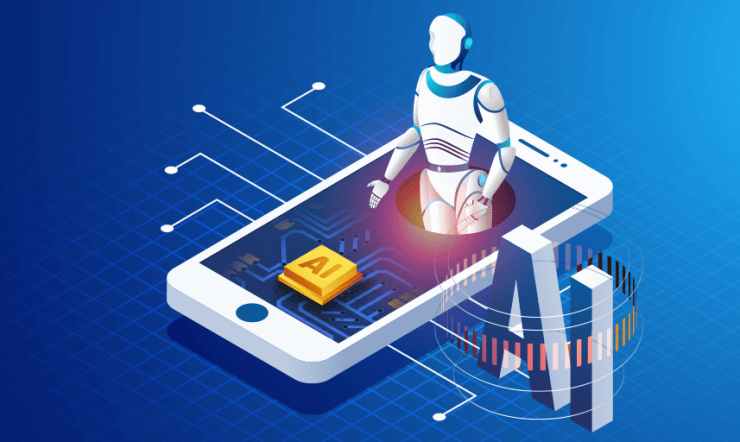Artificial Intelligence and Machine Learning in Mobile Application

The advent of 5G technology is set to revolutionize mobile app development in unprecedented ways. This next-generation wireless network promises significantly faster speeds, lower latency, and greater capacity compared to its predecessors. As 5G becomes more widely adopted, mobile app developers are presented with new opportunities and challenges to create innovative and enhanced user experiences. Here, we explore how 5G is transforming mobile app development.
The Evolution of AI and ML in Mobile Apps
The journey of AI and ML in mobile applications began with basic functionalities like predictive text and voice recognition. Over time, these technologies have evolved to incorporate more complex features such as image recognition, natural language processing, and real-time data analysis. This evolution has been fueled by advancements in computational power, the availability of vast amounts of data, and the development of sophisticated algorithms.
Key Areas of Impact
1. Personal Assistants and Chatbots
- AI-powered personal assistants like Siri, Google Assistant, and Alexa have revolutionized the way users interact with their devices. These assistants leverage natural language processing (NLP) to understand and respond to user queries, making everyday tasks more convenient.
- Chatbots integrated into mobile apps provide instant customer support, enhancing the user satisfaction and engagement. They can handle a wide range of queries, from troubleshooting issues to providing product recommendations.
2. Personalization
- Machine learning algorithms analyze user behavior and preferences to deliver personalized content and recommendations. Streaming services like Netflix and Spotify use ML to suggest movies, shows, and music based on individual user tastes.
- E-commerce apps employ AI to recommend products, optimize search results, and create personalized shopping experiences, thereby increasing conversion rates and customer loyalty.
3. Enhanced Security
- AI and ML are pivotal in strengthening mobile app security. Biometric authentication methods such as facial recognition and fingerprint scanning rely on AI to verify user identities, providing a robust layer of security.
- Machine learning models are used to detect fraudulent activities and potential threats in real-time, safeguarding user data and ensuring secure transactions.
4. Health and Fitness
- Mobile health apps leverage AI to monitor and analyze user health metrics. They provide personalized health advice, track physical activities, and even predict potential health issues based on historical data.
- Wearable devices integrated with AI can offer real-time health monitoring, making it easier for users to maintain a healthy lifestyle and for healthcare providers to deliver better care.
5. Augmented Reality (AR) and Image Recognition
- AI enhances AR experiences in mobile apps, allowing users to interact with virtual objects in the real world. Apps like Snapchat and Instagram use AR filters powered by AI to create engaging content.
- Image recognition technology, driven by AI, enables apps to identify objects, and landmarks, and even diagnose plant diseases, providing valuable information and functionality to users.
Challenges and Future Prospects
Despite the remarkable progress, integrating AI and ML into mobile apps comes with its own set of challenges. Issues such as data privacy, algorithmic bias, and the need for continuous learning and updating of models require careful consideration.
Looking ahead, the future of AI and ML in mobile apps is incredibly promising. With ongoing advancements in technology, we can expect even more sophisticated and intuitive applications that can anticipate user needs, provide proactive assistance, and offer seamless, personalized experiences. The integration of AI and ML will continue to push the boundaries of what mobile apps can achieve, driving innovation and shaping the future of technology.
Conclusion
AI and machine learning are at the forefront of transforming mobile applications. By enhancing personalization, improving security, enabling smarter health monitoring, and providing immersive experiences, these technologies are redefining the way users interact with their mobile devices. As developers and businesses continue to explore the potential of AI and ML, the landscape of mobile apps will undoubtedly become more dynamic, efficient, and user-centric. Embracing these advancements will be key to staying competitive in an ever-evolving digital world.
More Blog

Efficient App Development

Mobile App Navigation


